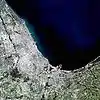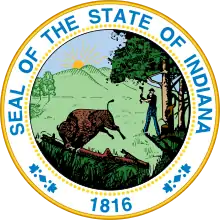Michigan City, Indiana
Michigan City is a city in LaPorte County, Indiana, United States. It is one of the two principal cities of the Michigan City-La Porte, Indiana Metropolitan statistical area, which is included in the Chicago-Naperville-Michigan City Combined statistical area. In the region known to locals as Michiana, the city is about 50 miles (80 km) east of Chicago and 40 miles (64 km) west of South Bend. It had a population of 31,479 at the 2010 census.
City of Michigan City | |
|---|---|
City | |
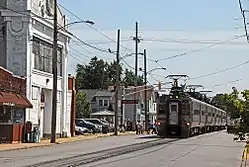 A South Shore Line train stops at 11th Street station. | |
 Location of Michigan City in LaPorte County, Indiana. | |
| Coordinates: 41°42′34″N 86°53′13″W | |
| Country | United States |
| State | Indiana |
| County | LaPorte |
| Townships | Michigan, Coolspring |
| Government | |
| • Mayor | Duane Parry (R) |
| Area | |
| • Total | 20.59 sq mi (53.33 km2) |
| • Land | 20.41 sq mi (52.85 km2) |
| • Water | 0.18 sq mi (0.48 km2) |
| Elevation | 627 ft (191 m) |
| Population | |
| • Total | 31,479 |
| • Estimate (2019)[3] | 31,015 |
| • Density | 1,519.82/sq mi (586.82/km2) |
| Time zone | UTC−6 (CST) |
| • Summer (DST) | UTC−5 (CDT) |
| ZIP codes | 46360-46361 |
| Area code(s) | 219 |
| FIPS code | 18-48798[4] |
| GNIS feature ID | 0439078[5] |
| Website | emichigancity |
Michigan City is noted for both its proximity to Indiana Dunes National Park and for bordering Lake Michigan. It receives a fair amount of tourism during the summer, especially by residents of Chicago and nearby cities in Northern Indiana. The lighthouse is a notable symbol of the city and is incorporated in the heading of its sole newspaper, The News Dispatch, and its official seal.
Geography
Michigan City is located at 41°42′34″N 86°53′13″W (41.709389, -86.886928).[6]
According to the 2010 census, Michigan City has an area of 22.855 square miles (59.19 km2), of which 19.59 square miles (50.74 km2) (or 85.71%) is land and 3.265 square miles (8.46 km2) (or 14.29%) is water.[7]
Michigan City is home to Trail Creek, which flows into Lake Michigan.
Demographics
| Historical population | |||
|---|---|---|---|
| Census | Pop. | %± | |
| 1850 | 999 | — | |
| 1860 | 3,320 | 232.3% | |
| 1870 | 3,985 | 20.0% | |
| 1880 | 7,366 | 84.8% | |
| 1890 | 10,773 | 46.3% | |
| 1900 | 14,850 | 37.8% | |
| 1910 | 19,027 | 28.1% | |
| 1920 | 19,457 | 2.3% | |
| 1930 | 26,735 | 37.4% | |
| 1940 | 26,476 | −1.0% | |
| 1950 | 28,395 | 7.2% | |
| 1960 | 36,653 | 29.1% | |
| 1970 | 39,369 | 7.4% | |
| 1980 | 36,850 | −6.4% | |
| 1990 | 33,822 | −8.2% | |
| 2000 | 32,900 | −2.7% | |
| 2010 | 31,479 | −4.3% | |
| 2019 (est.) | 31,015 | [3] | −1.5% |
| Source: US Census Bureau | |||
2010 census
As of the census[2] of 2010, there were 31,479 people, 12,136 households, and 7,147 families living in the city. The population density was 1,606.9 inhabitants per square mile (620.4/km2). There were 14,435 housing units at an average density of 736.9 per square mile (284.5/km2). The racial makeup of the city was 64.9% White, 28.1% African American, 0.4% Native American, 0.7% Asian, 2.1% from other races, and 3.7% from two or more races. Hispanic or Latino of any race were 5.9% of the population.
There were 12,136 households, of which 30.5% had children under the age of 18 living with them, 33.4% were married couples living together, 19.0% had a female householder with no husband present, 6.5% had a male householder with no wife present, and 41.1% were non-families. 34.3% of all households were made up of individuals, and 12% had someone living alone who was 65 years of age or older. The average household size was 2.37 and the average family size was 3.05.
The median age in the city was 37.1 years. 23.5% of residents were under the age of 18; 8.9% were between the ages of 18 and 24; 27.8% were from 25 to 44; 26.2% were from 45 to 64; and 13.5% were 65 years of age or older. The gender makeup of the city was 51.4% male and 48.6% female.
2000 census
As of the census[4] of 2000, there were 32,900 people, 12,550 households, and 7,906 families living in the city. The population density was 1,678.6 inhabitants per square mile (648.1/km2). There were 14,221 housing units at an average density of 725.6 per square mile (280.1/km2). The racial makeup of the city was 69.45% White, 26.31% African American, 0.26% Native American, 0.51% Asian, 0.02% Pacific Islander, 1.10% from other races, and 2.36% from two or more races. Hispanic or Latino of any race were 3.15% of the population.
There were 12,550 households, out of which 30.6% had children under the age of 18 living with them, 40.0% were married couples living together, 18.1% had a female householder with no husband present, and 37.0% were non-families. 30.9% of all households were made up of individuals, and 11.6% had someone living alone who was 65 years of age or older. The average household size was 2.41 and the average family size was 3.02.
In the city, the population was spread out, with 25.0% under the age of 18, 9.6% from 18 to 24, 30.8% from 25 to 44, 20.6% from 45 to 64, and 14.1% who were 65 years of age or older. The median age was 35 years. For every 100 females, there were 101.8 males. For every 100 females age 18 and over, there were 100.9 males.
The median income for a household in the city was $33,732, and the median income for a family was $39,520. Males had a median income of $32,194 versus $23,125 for females. The per capita income for the city was $16,995. About 10.4% of families and 13.3% of the population were below the poverty line, including 20.2% of those under age 18 and 9.5% of those age 65 or over.
Climate and weather
| Michigan City, Indiana | ||||||||||||||||||||||||||||||||||||||||||||||||||||||||||||
|---|---|---|---|---|---|---|---|---|---|---|---|---|---|---|---|---|---|---|---|---|---|---|---|---|---|---|---|---|---|---|---|---|---|---|---|---|---|---|---|---|---|---|---|---|---|---|---|---|---|---|---|---|---|---|---|---|---|---|---|---|
| Climate chart (explanation) | ||||||||||||||||||||||||||||||||||||||||||||||||||||||||||||
| ||||||||||||||||||||||||||||||||||||||||||||||||||||||||||||
| ||||||||||||||||||||||||||||||||||||||||||||||||||||||||||||
The highest recorded temperature was 104 °F (40 °C) in 1953. The lowest recorded temperature was −23 °F (−31 °C) in 1994.[8]
The city has a usual weather pattern for a temperate region, with thunderstorms in the summer and snow during winter. Summers are often warm and humid. Due to its location next to Lake Michigan the city frequently experiences lake-effect snows and rain showers.
History
Michigan City's origins date to 1830, when the land for the city was first purchased by Isaac C. Elston, a real estate speculator who had made his fortune in Crawfordsville, Indiana. He paid about $200 total for 160 acres (65 ha) of land. The now-closed Elston Middle School, formerly Elston High School, was named after the founder.[9]
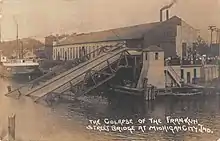
The city was incorporated in 1836, by which point it had 1,500 residents, along with a post office, a newspaper, a church, a commercial district and ten hotels. In these six years the town had grown to a size of 15 square miles (39 km2). That same year, the State Bank of Indiana opened a branch in town.
Michigan City hosted the sailing competitions of the 1987 Pan American Games on Lake Michigan. Indianapolis, roughly 150 miles (240 km) southeast, was the host city.[10]
Points of interest
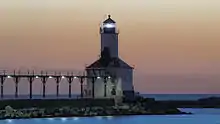
Michigan City is the home of the Old Michigan City Light; and the newer currently functioning one which is Indiana's only lighthouse.
The Pullman-Standard rail car plant was located in Michigan City.
Lighthouse Place Premium Outlet mall, opened in 1987 on the city's North end, is an outdoor mall.[11] Marquette Mall, constructed in 1965, was Michigan City's sole indoor shopping mall until closing during the early 2000s recession.
Franciscan Health Michigan City is Michigan City's main hospital, located just off of the 94 highway.[12]
Michigan City also houses a zoo, and art center, and also is the home of the Indiana State Prison.[13]
Michigan City also has one of the nation's oldest active municipal bands. Free concerts are performed for the public every Thursday evening at the Guy F. Foreman Amphitheatre located in Washington Park.
The eastern edge of Indiana Dunes National Park is also located in Michigan City. Features include Mount Baldy, a large wandering dune. A larger dune, Hoosier Slide, sat at the site of the current electrical generating station.[14] This dune was mined for its sand in the late 19th century. The sand found on the beaches in and near Michigan City is nicknamed "singing sand" because of the sound it produces.[15][16]
Michigan City Power Plant lies along the shore of Lake Michigan west of the downtown core. The cooling tower of the coal burning plant is visible for miles around and is often mistaken for a nuclear power plant.
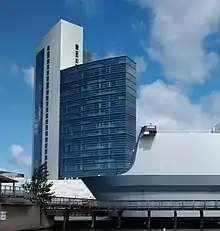
Michigan City is home to the largest riverboat casino in Indiana, the Blue Chip Casino. In 2009, the Blue Chip complex added a 22-story hotel, which is the biggest building in northwest Indiana.[17] Michigan City has also added a new skatepark at Pullman Field to its tourism offerings.[13]
In the 2000s and 2010s, Michigan City has been working on revitalizing much of its north end, which contains the oldest portions of the city. One plan that has been discussed is the Andrews Plan,[18][19] which won the 2008 CNU Charter Award of Excellence.[20] Most of the discussion centers on maintaining and expanding open and accessible park areas on Lake Michigan and along Trail Creek.
The Barker House, John H. Barker Mansion, Elston Grove Historic District, First Congregational Church of Michigan City, Franklin Street Commercial Historic District, Garrettson-Baine-Bartholomew House, Haskell and Barker Historic District, Michigan City East Pierhead Light Tower and Elevated Walk, Michigan City Light, Michigan City Post Office, MUSKEGON Shipwreck Site, and Washington Park are listed in the National Register of Historic Places.[21][22][23][24]
Government
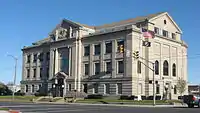
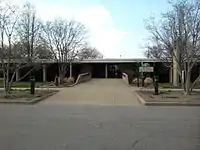
The mayor is Duane Parry.[25] Michigan City has a Council with nine members. Six are elected from geographic wards and three are elected as at-large members.[26]
City Council members are (as of March 2020):
- Bryant Dabney, First Ward
- Paul Pryzbylinski, Second Ward
- Michael Mack, Third Ward, Council President
- Sean Fitzpatrick, Fourth Ward,
- Tracie Tillman, Fifth Ward
- Gene Simmons, Sixth Ward
- Dalia Zygas, Councilwoman-at-Large
- Angie Nelson-Deuitch, Councilwoman-at-Large, Council Vice President
- Donald Przybylinski, Councilman-at-Large
Education
Michigan City Area Schools, the city's public school system, includes one high school (Michigan City High School), two middle schools, and eight elementary schools. Michigan City previously also had three parochial high schools – Marquette, La Lumiere, and Duneland Lutheran but, due to a lack of funds, Duneland Lutheran closed down at the end of the 2008/2009 school year. There are several parochial elementary schools in the city, including St. Paul Lutheran School, St. Stanislaus Kostka School, Queen Of All Saints School, and Notre Dame Catholic School.
At one time Michigan City had two public high schools: M.C. Elston High School (Red Devils) (Elston was the name of one of the middle schools located in the city and was located at the former Elston High School), and M.C. Rogers High School (Raiders). The two schools combined after the 1994–1995 school year – the first graduating class was the Class of 1996 – and now constitute the present day Michigan City High School (Wolves). The school is located at the former Rogers High School site. Elston Middle School, along with elementary school Niemann, closed at the end of the 2013/2014 school year.
Michigan City has a lending library, the Michigan City Public Library.[27] In addition, the La Porte County Public Library operates the Coolspring branch library just outside Michigan City city limits.[28]
Media
Paper
The La Porte County Herald-Dispatch is Michigan City's only subscription newspaper, covering the city and the surrounding municipalities in LaPorte and Porter counties.[29] The Beacher is a Michigan City-based weekly newspaper that covers Beverly Shores, Michigan City, Long Beach, LaPorte, Michiana and New Buffalo.
Chicago Tribune, Chicago Sun-Times and South Bend Tribune are distributed throughout Michigan City. Off the Water, a free weekly art and entertainment newspaper published by Niles, Michigan-based Leader Publications, primarily focuses on Niles-Benton Harbor Metropolitan Statistical Area, but it is distributed in downtown Michigan City.
Broadcast
Michigan City is in Chicago's Area of Dominant Influence. Radio and television broadcasts from both Chicago and South Bend reach most of the population.
Radio
Michigan City also has two FM radio stations, WEFM 95.9FM and WIMS 95.1FM, and one AM radio station, WIMS AM 1420.[30]
Television
The city has one Government-access television (GATV) station, Access LaPorte County,[31] as well as one channel operated by the local school system (MCAS).[32]
Transportation
Rail
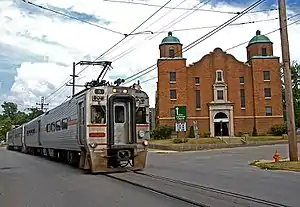
Michigan City is a major stop along the South Shore Line, one of the last interurban rail lines in the U.S. The train runs directly through on 11th Street (it has no separate right-of-way, and shares the street with automobiles and other road traffic), making two stops in Michigan City's downtown area (11th Street and Carroll Avenue). A third stop, at Willard Avenue and 10th Street, closed in 1994. This rail line connects Michigan City with downtown Chicago westward as well as the South Bend Regional Airport to the east.
Amtrak serves the city with Wolverine trains, which run from Chicago to Detroit, and Pontiac three times a day in each direction. Under the current schedule, Wolverine fills in several gaps in South Shore Line's weekday service and augments weekend service. While Wolverine trains are faster, the South Shore Line is cheaper and runs more frequently.
Bus
Michigan City operates a bus service.[33] Officially known as Michigan City Transit, it is made up of four routes that run on Monday-Saturday. All routes originate at Michigan City Public Library and travel around the city in (largely mono-directional) loops until they return to the library. Route 3 connects to Carroll Avenue South Shore Line station, while other routes connect to the 11th street station. In addition, Route 1 passes near the Amtrak station on the way to Washington Park. Michigan City also operates a Dial-a-Bus service.
Coach USA's Indiana Airport SuperSaver service between The University of Notre Dame and O'Hare airport stopped at Michigan City at the La Porte County Convention and Visitors Bureau at Marquette Mall (4073 S. Franklin St).[34] The service made stops at Notre Dame, South Bend, Portage, Highland, Crestwood and O'Hare and Midway airports. Buses ran from 4:10 am – 1:10 am (US Central Time). Buses ran once every hour in both direction between Michigan City and O'Hare and Midway and once every two hours between Michigan City and Notre Dame. On December 10, 2019 Coach USA announced it will cease operations of its Indiana Airport SuperSaver service effective January 1, 2020.[35]
Air
Michigan City Municipal Airport has a 4,100 foot asphalt runway and averages 118 operations per week.
Options for commercial air service include the Gary/Chicago International Airport in Gary, and the South Bend International Airport in South Bend. The South Shore Line terminates at the South Bend airport, while there is a train stop serving the Gary airport.
Notable people
- Jean Baptiste Point du Sable is regarded as the first permanent resident of Chicago, Illinois. In 1779, he was living on the site of present-day Michigan City, Indiana, when he was arrested by the British military on suspicion of being an American sympathizer in the American Revolutionary War.
- Daniel D. Bruce, United States Marine who was posthumously awarded the Medal of Honor for heroism in Vietnam in March 1969
- Howard G. "Ward" Cunningham, author, software developer and inventor of the word and concept of the "wiki"
- Marilla Waite Freeman was the first Librarian of the Michigan City Public Library upon its opening in 1897.[36]
- Allan Spear, eminent U.S. historian and political progressive, author, Black Chicago: The Making of a Negro Ghetto; president Minnesota State Senate, early advocate for gay people
Actors
- Charles Arnt, actor
- Anne Baxter, Academy Award-winning actress
- Rati Gupta, dancer and actress known for her recurring role as Anu, the fiancée of Raj Koothrappali in the CBS sitcom The Big Bang Theory.
Journalist/Writers
- Alvera Mickelsen, writer, journalism professor, advocate of Christian feminism, and co-founder of Christians for Biblical Equality (CBE)[37]
- Achy Obejas, writer and journalist
- Amy Spindler, fashion critic and style editor of The New York Times Magazine
- Ted Thorne, Chicago news anchor, local radio host
Politicians
- Naomi Anderson, a black suffragist
- Richard G. Hatcher, mayor of Gary, Indiana
- John Huppenthal, Republican State senator in the Arizona State Legislature
- David E. Lilienthal, Chairman of the Tennessee Valley Authority 1941–1946; Chairman, U.S. Atomic Energy Commission, 1947–1949
- Zeola Hershey Misener, suffragist and one of the first women elected to the Indiana General Assembly
- Scott Pelath, former Indiana House of Representatives member
- John L. Sieb, member of the Wisconsin State Assembly, barber
Sports
- Abe Gibron, Chicago Bears football player and head coach
- Anita King, racecar driver, actress, and thoroughbred racehorse owner
- Mike LaRocco, professional Supercross and Motocross racer
- Don Larsen, Major League Baseball pitcher
- John Parry, former National Football League official
- Donnie Thomas, former linebacker for the New England Patriots
Artists
- Charles Freeman Lee, jazz trumpeter in the 1950s and 1960s, taught Science at Krueger School in Michigan City after retiring from music
Notes
- "2019 U.S. Gazetteer Files". United States Census Bureau. Retrieved July 16, 2020.
- "U.S. Census website". United States Census Bureau. Retrieved 2012-12-11.
- "Population and Housing Unit Estimates". United States Census Bureau. May 24, 2020. Retrieved May 27, 2020.
- "U.S. Census website". United States Census Bureau. Retrieved 2008-01-31.
- "US Board on Geographic Names". United States Geological Survey. 2007-10-25. Retrieved 2008-01-31.
- "US Gazetteer files: 2010, 2000, and 1990". United States Census Bureau. 2011-02-12. Retrieved 2011-04-23.
- "G001 - Geographic Identifiers - 2010 Census Summary File 1". United States Census Bureau. Archived from the original on 2020-02-13. Retrieved 2015-07-29.
- "Monthly Averages for Michigan City, IN (46360)". The Weather Channel. Retrieved 5 October 2013.
- Michigan City Area Schools
- "Pan Am Games Schedule". United Press International, Inc. July 29, 1987. Retrieved April 19, 2020.
- Pete, Joseph S. (11 June 2017). "Thirty years ago, Lighthouse Place Mall changed Michigan City". nwitimes.com. The Times. Retrieved 16 September 2020.
- State of Indiana, Indiana 2009 Travel Guide. Indianapolis, Indiana; 2009.
- Indiana 2009 Travel Guide
- "Hoosier Slide". monon.org. Archived from the original on 2013-10-05. Retrieved 5 October 2013.
- "Best Beach: Washington Park Beach". Lake Magazine (electronic version). July 2005. Archived from the original on 2007-10-08. Retrieved 2006-04-29.
- "404エラー www.bigai.ne.jp". bigai.ne.jp.
- Casino and Hotel
- "The North End Plan". cnu.org.
- Contact information
- "North end could be "choice area" - City by the Lake.org, The Voice of Michigan City, Indiana". citybythelake.org.
- "National Register Information System". National Register of Historic Places. National Park Service. July 9, 2010.
- "National Register of Historic Places Listings". Weekly List of Actions Taken on Properties: 9/16/13 through 9/30/13. National Park Service. 2013-10-18.
- "National Register of Historic Places Listings". Weekly List of Actions Taken on Properties: 12/30/13 through 1/03/14. National Park Service. 2014-01-10.
- "National Register of Historic Places Listings". Weekly List of Actions Taken on Properties: 9/29/14 through 10/03/14. National Park Service. 2014-10-10.
- "Mayors Office". Retrieved 5 October 2013.
- "City Departments - City Council". Retrieved 7 September 2016.
- "Indiana public library directory" (PDF). Indiana State Library. Retrieved 8 March 2018.
- "Library Hours & Information". La Porte County Public Library. Retrieved 8 March 2018.
- "The News Dispatch". Retrieved 5 October 2013.
- "WIMS". Retrieved 5 October 2013.
- "ACCESS LA PORTE COUNTY". Archived from the original on 5 October 2013. Retrieved 5 October 2013.
- "MCAS T.V." Retrieved 5 October 2013.
- "eMichiganCity.com - The Official Web Site of the City of Michigan City, Indiana: City Departments - MC Transit". emichigancity.com.
- "Chicago O'Hare Airport, IL to Michigan City, Indiana". Coach USA. Retrieved March 20, 2015.
- "To and From O'Hare and Midway Airport" (PDF). Coach USA. Archived from the original (PDF) on February 9, 2015. Retrieved March 20, 2015.
- "History – Michigan City Public Library". www.mclib.org. Retrieved 31 March 2018.
- Painter, Kristen Leigh (2016-07-20). "Obituary: Professor, nonprofit leader Alvera Mickelsen blended feminism and Christian teaching". Star Tribune. Retrieved 2016-08-06.
References
- Reynolds, Francis J., ed. (1921). . Collier's New Encyclopedia. New York: P. F. Collier & Son Company.
- Ripley, George; Dana, Charles A., eds. (1879). . The American Cyclopædia.
External links
| Wikimedia Commons has media related to Michigan City, Indiana. |
| Wikisource has the text of the 1911 Encyclopædia Britannica article Michigan City. |
